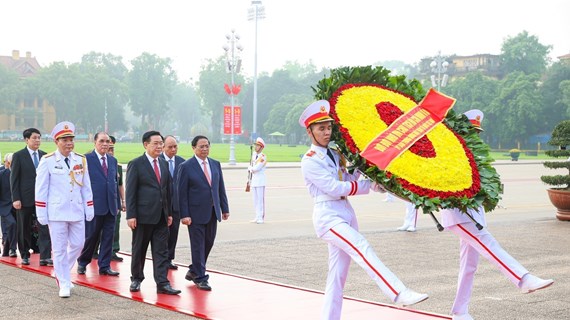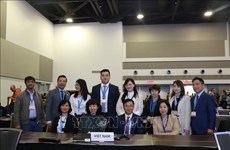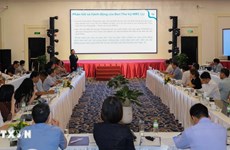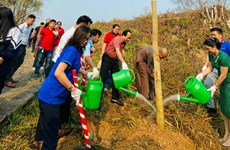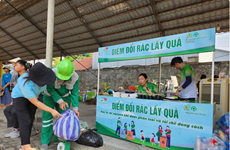Vietnam exerts efforts in environmental protection
Preventing and minimising environmental pollution and biodiversity
decline are one of the top priorities of the Vietnamese Government, a
senior official from the Ministry of Natural Resources and Environment
(MONRE) has said.
Preventing and minimising environmental pollution and biodiversity
decline are one of the top priorities of the Vietnamese Government, a
senior official from the Ministry of Natural Resources and Environment
(MONRE) has said.
Deputy Minister Bui Cach Tuyen made the statement at the opening ceremony of the 17th meeting of the ASEAN Working Group on multilateral environmental agreements in Hanoi on July 4.
He said although Vietnam has recorded a number of remarkable achievements in socio-economic development, it still faces challenges in environmental pollution and declining biodiversity.
The 2005 Environmental Protection Law and the 2008 Biodiversity Law have provided a necessary legal framework for environmental protection activities in the country, he said.
He added that the national target programme on surmounting pollution and improving the environment, as well as the national strategy on environmental protection by 2020 with a vision to 2030 are important policy tools that hasten national-level activities to protect the environment.
According to Tuyen, the global environment has drawn much attention from the international community during the recent decades. A great number of international commitments on the environment have been signed with an aim to solve environmental issues.
In particular, the establishment of the ASEAN Working Group on multilateral environmental agreements demonstrates the great efforts and high consensus of the association’s member countries in realising regional and international environment agreements, he said.
Since it was set up, the working group has made significant achievements in environmental protection. However, it has not yet outlined specific programmes and activities to implement multilateral agreements in the field.
Co-organised by the Vietnam Environment Administration and Department of International Cooperation under the Ministry of Natural Resources and Environment, the four-day meeting aims to review the progress made by ASEAN member states at the 16th meeting of the group, and take into account the proposed initiatives.
The ASEAN Secretariat will update the regional implementation situation and ongoing activities.
In addition, the conference will review related activities and events such as the Basel Convention on the Control of Transboundary Movements of Hazardous Waste and Their Disposal, the Rotterdam Convention on the Prior Informed Consent Procedure for Certain Hazardous Chemicals and Pesticides in International Trade, the Stockholm Convention on Persistent Organic Pollutants (POPs), and the Montreal Protocol on Substances that Deplete the Ozone Layer.-VNA
Deputy Minister Bui Cach Tuyen made the statement at the opening ceremony of the 17th meeting of the ASEAN Working Group on multilateral environmental agreements in Hanoi on July 4.
He said although Vietnam has recorded a number of remarkable achievements in socio-economic development, it still faces challenges in environmental pollution and declining biodiversity.
The 2005 Environmental Protection Law and the 2008 Biodiversity Law have provided a necessary legal framework for environmental protection activities in the country, he said.
He added that the national target programme on surmounting pollution and improving the environment, as well as the national strategy on environmental protection by 2020 with a vision to 2030 are important policy tools that hasten national-level activities to protect the environment.
According to Tuyen, the global environment has drawn much attention from the international community during the recent decades. A great number of international commitments on the environment have been signed with an aim to solve environmental issues.
In particular, the establishment of the ASEAN Working Group on multilateral environmental agreements demonstrates the great efforts and high consensus of the association’s member countries in realising regional and international environment agreements, he said.
Since it was set up, the working group has made significant achievements in environmental protection. However, it has not yet outlined specific programmes and activities to implement multilateral agreements in the field.
Co-organised by the Vietnam Environment Administration and Department of International Cooperation under the Ministry of Natural Resources and Environment, the four-day meeting aims to review the progress made by ASEAN member states at the 16th meeting of the group, and take into account the proposed initiatives.
The ASEAN Secretariat will update the regional implementation situation and ongoing activities.
In addition, the conference will review related activities and events such as the Basel Convention on the Control of Transboundary Movements of Hazardous Waste and Their Disposal, the Rotterdam Convention on the Prior Informed Consent Procedure for Certain Hazardous Chemicals and Pesticides in International Trade, the Stockholm Convention on Persistent Organic Pollutants (POPs), and the Montreal Protocol on Substances that Deplete the Ozone Layer.-VNA





